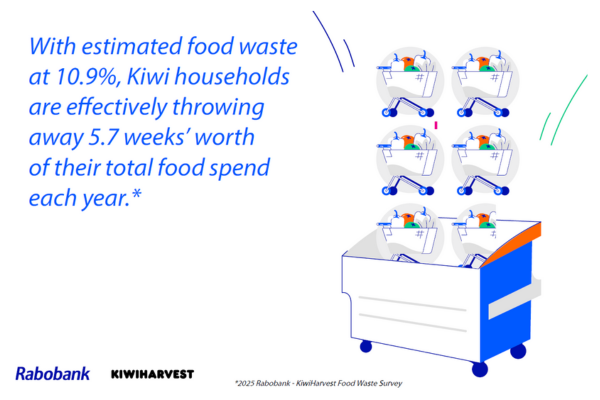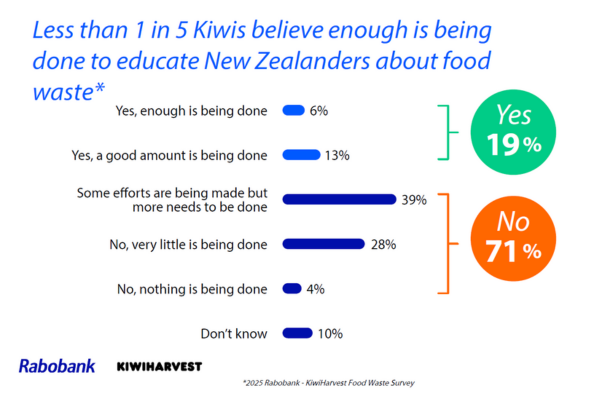2025 Rabobank-KiwiHarvest Food Waste Survey results at a glance:
• New Zealanders are wasting less of their food than two years ago with the estimated percentage of household food waste dropping to 10.9% from 12.2% in 2023
• This fall has driven a decrease in the overall value of wasted food across New Zealand, with this now dipping to $3.0 billion per annum (from $3.2 billion in 2023) despite marginal increases in household food spend and the total number of households
• While Kiwis food waste attitudes and behaviours are largely similar to 2023, small improvements in a few key areas helped drive food waste lower
• 35% of Kiwis say they are wasting less food than they did a year ago with only 5% saying their food waste has increased

*2025 Rabobank - KiwiHarvest Food Waste Survey

*2025 Rabobank - KiwiHarvest Food Waste Survey
• ‘Food going off before you can eat it’ (45 per cent) and ‘before use by and best before dates’ (33 per cent) remain the reasons most frequently cited for food waste
• New Zealanders remain the most concerned about ‘the wasted money’ resulting from food waste, with this cited as a key concern by 73 per cent of respondents
• Despite the reduction in overall food waste, less than one in five New Zealanders thinks enough is being done to address the issue.
Kiwis are wasting less of their food than they were two years ago, and this has been enough to push Aotearoa’s total household food waste bill lower, the 2025 Rabobank-KiwiHarvest Food Waste survey has found.
The survey – undertaken in late July – found the average New Zealand household reported wasting 10.9% of the food they bought each week, back from 12.2% in the 2023 survey. This fall drove a drop in annual food waste per household (down to $1,364 from $1,510 in 2023) and a reduction in New Zealand’s overall food waste bill. This fell to $3.0 billion per annum from $3.2 billion (fall of 6.25%) despite marginal increases in weekly household food spend and the number of households.
Rabobank partnered with food rescue charity KiwiHarvest in early 2020, as part of the bank’s wider commitment to work alongside its rural customers to support sustainable food production and its global vison around global food security. Rabobank has commissioned research examining Kiwis’ food waste habits since 2017 – the four most recent editions of the research (2021,2022, 2023 & 2025) in collaboration with KiwiHarvest – to help raise awareness of this issue and, ultimately to reduce the volume of quality food we currently produce that ends up going to waste.
The latest drop in household food waste was the second consecutive fall recorded by the survey, following a reading of 13.4% in the 2022 survey.
KiwiHarvest CEO Angela Calver said it was encouraging to see food waste trending lower across recent years.
“It’s really pleasing to see things are heading in the right direction. However, this year’s estimated food waste, valued at $3.0 billion, is still too high and remains a major concern,” she said.
“At average annual waste of 10.9% per household, Kiwi households are effectively throwing away nearly six weeks’ worth of groceries each year.”
Ms Calver said with more Kiwi kids now living in households where food regularly runs out1, demand for KiwiHarvest’s food rescue services had never been greater.
“Since the last food waste survey in mid-2023, KiwiHarvest has increased the volume of food that we rescue by 52%, and we are now providing the equivalent of over 125,000 meals back into the community each week,’’ she said.
“With so many Kiwis in need, it’s crucial we continue to prioritise public education on food waste and ensure the amount of perfectly good food New Zealanders are wasting continues to fall.”
“KiwiHarvest is committed to working with Rabobank and other partners to tackle this issue by empowering New Zealanders with practical information to help reduce food waste at home.”
Small improvements helping drive food waste lower
While Kiwis attitudes to, and knowledge of, food waste were largely in line with the 2023, Rabobank Head of Sustainable Business Development Blake Holgate, said small improvements in a few key areas had helped drive the dip in estimated food waste recorded in the 2025 survey.
“The latest survey found there is now a larger group of Kiwis committed to addressing food waste with more saying they “strongly agree’ with statements including ‘I care about reducing food waste’ (33% strongly agree from 23%), ‘It annoys me when I waste food’ (38% from 30%), and “It annoys me when I see others wasting food’ (31% from 23%),” he said.
“The survey also found Kiwis knowledge of food production was on the rise with 37% saying they know ‘quite a bit’ or a ‘great deal’ about this topic, and this was showing up in growing food waste concerns related to the wasted efforts of farmers here in New Zealand and abroad.”
Mr Holgate said these changes were filtering through to improvements in food waste-related behaviours.
“More Kiwis in the latest survey said they were ‘always’ using shopping lists’ (64% from 60%) and ‘always’ planning their meals (39% from 36%) and this all helps to reduce food waste by cutting down on unnecessary purchases,” he said.
“We’ve also seen a lift in the proportion of New Zealanders saying ‘I cook with or encourage my family to cook using all the edible parts of the vegetables’ (56% from 53%).”
“In addition, less Kiwis also now say they have purchased food in the last 12 months that they ended up throwing away without trying (49% from 52%), and this behaviour is also becoming less frequent among those who have done it.”
Mr Holgate said cost-of-living pressures were also likely contributing to food waste-related behavioural changes within households.
“The latest survey found the average household food spend was only just higher than it was in 2023 ($240 from $238) and, with food price inflation high over this period, households have effectively had to cut back on the amount of food they buy,” he said.
“Just under a third of Kiwis (31%)2 said they have reduced the amount of groceries they buy as a result of rising prices, and this has undoubtedly forced Kiwis to be a bit more selective about their food purchases, and to pick less items that might end up in the bin.”
Whatever the specific reasons for the behavioural changes, Mr Holgate said, all these small adjustments were making a difference.
“Overall, the survey found more than a third of New Zealanders (35%) say the proportion of food their household was wasting has reduced across the last year, with only 5% saying it had increased.”
Food waste basics
The survey found the foods most regularly wasted were in line with 2023, with vegetables (39 per cent), bread (28 per cent) and fruit (24 per cent) continuing to hold the top three spots on the list.
The key reasons for wasting food were also similar to two years ago with ‘food going off before you can finish it’ (45 per cent) and ‘before use by and best before dates’ (33 per cent) the major reasons cited.
The major food waste concerns remained ‘the wasted money’ (73 per cent) and ‘feelings of guilt that other people around New Zealand going without’ (37 per cent).
“As was the case in 2023, Mr Holgate said, the most frequently cited perceived impact of food waste was ‘landfill’ with this holding steady at 62% (63% last survey).
“However, there was a noticeable drop off with some of the other perceived impacts with ‘pollution’ (40%), ‘climate change’ (24%), ‘deforestation’ (19%) and ‘water shortages’ (17%) all recording significantly lower scores than two years ago.”
Across the generations
The survey found estimated food waste reduced with age, with Gen Z respondents recording average food waste of 17.8%, Gen Y 14.1%, Gen X 10.4% and Baby Boomers 6.8%.
Mr Holgate said all generations estimated they were less wasteful than in 2023 with the younger generations recording the biggest improvements.
“While Gen Z continues to be the most wasteful, they have shown some big improvements across recent years,” he said.
“Back in 2022, Gen Z estimated they wasted an astronomical 28.2% of their weekly food spend, so there has been quite a shift across the last three years.”
“There is still ample room for improvement, but it does appear those in Gen Z now have an improved understanding of the negative impacts of food waste.
“And this did also come through in the survey results with Gen Z recording the highest familiarity (47%) of all the generations when it came to awareness of Rabobank and KiwiHarvest food waste initiatives.”
The survey also found males recorded higher estimated food waste (11.5%) than females (10.3%), while urban dwellers were more wasteful (12.4%) than their urban counterparts (7.8%).
Taking the lead on food waste education
For the first time, Ms Calver said, this year’s survey asked participants whether enough was being done to educate Kiwis on food waste and who should take responsibility.
“The results were really compelling with less than one in five (19%) of Kiwis believing enough is being done to educate New Zealanders in this area,” she said.
“This sends a strong message about how important Kiwis think this issue is, and it’s not surprising given the multitude of both financial and environmental benefits that come with decreased household food waste.”
When it came to who New Zealanders felt should bear the responsibility for food waste education, most felt the primary responsibility lay with parents/ caregivers (34%), the government and education system (28%) or the food industry (21%), with local councils (8%), media (5%), charities and community groups (2%) and public figures (2%) deemed less accountable.
“Ultimately, there are a range of groups that have the ability to shift the dial on the food waste front, and it’s our view that greater collaboration across all of these groups is required if we’re going to make further inroads on New Zealand’s food waste issue,” Ms Calver said.
1Annual Update of Key Results 2023/24: New Zealand Health Survey | Ministry of Health NZ
2Kantar NZ Consumer Sentiment Barometer, April 2025
About the Survey
Rabobank partnered with KiwiHarvest in 2020 as part of the bank’s wider commitment to work alongside its rural customers to support sustainable food production and its global vison around global food security. The Rabobank-KiwiHarvest Food Waste Survey was first conducted in April 2021, with the findings released in June of that year. The 2025 Rabobank-KiwiHarvest Food Waste survey was administered by independent research agency KANTAR and involved interviews with 1501 New Zealanders between July 14 and July 28 2025. Data collection was nationally representative to ensure that results could be used to measure New Zealanders attitudes and behaviours.
